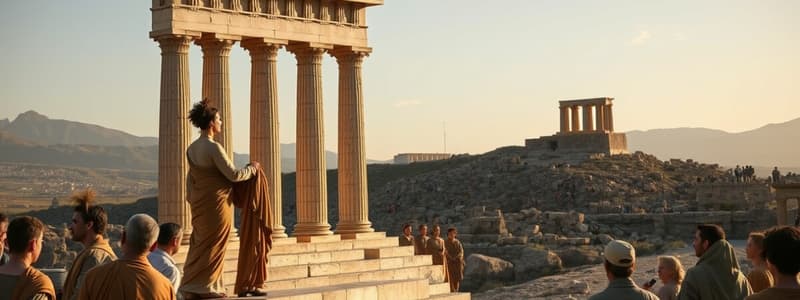Podcast
Questions and Answers
How did the rise of democracy in Europe influence rhetoric?
How did the rise of democracy in Europe influence rhetoric?
- It reduced the importance of rhetoric in education.
- It shifted rhetoric back to political discourse. (correct)
- It limited rhetoric to religious contexts only.
- It made rhetoric solely a written form of communication.
What was one significant impact of the Renaissance on rhetoric?
What was one significant impact of the Renaissance on rhetoric?
- The complete replacement of Latin with modern languages in academia.
- The decline of the vernacular language in studies.
- The publication of new works and books on rhetoric. (correct)
- The introduction of statistical analysis in speeches.
Which work by Hugh Blair significantly influenced rhetoric education in universities?
Which work by Hugh Blair significantly influenced rhetoric education in universities?
- Lectures on Rhetoric and Belles-Lettres (correct)
- The Rhetorical Tradition
- The Art of Rhetoric
- De Inventione
What effect did the mass media of the 20th century have on the study of rhetoric?
What effect did the mass media of the 20th century have on the study of rhetoric?
What was a key characteristic of rhetoric during the Medieval period?
What was a key characteristic of rhetoric during the Medieval period?
Where is it believed that rhetoric originated?
Where is it believed that rhetoric originated?
Who is considered the first sophist in rhetoric?
Who is considered the first sophist in rhetoric?
What was a significant influence on the development of classical rhetoric in ancient Athens?
What was a significant influence on the development of classical rhetoric in ancient Athens?
How did the Sophists redefine rhetoric?
How did the Sophists redefine rhetoric?
Which era is NOT associated with classical rhetoric?
Which era is NOT associated with classical rhetoric?
Which philosopher is known for his significant contributions to rhetoric in ancient Greece?
Which philosopher is known for his significant contributions to rhetoric in ancient Greece?
What role did rhetoric play in ancient Athenian democracy?
What role did rhetoric play in ancient Athenian democracy?
What did Tisias contribute to the field of rhetoric?
What did Tisias contribute to the field of rhetoric?
What was the primary focus of the educational system developed for rhetoric during the time of its inception?
What was the primary focus of the educational system developed for rhetoric during the time of its inception?
Which notable figure is associated with utilizing pagan rhetoric to spread the Gospel during the Middle Ages?
Which notable figure is associated with utilizing pagan rhetoric to spread the Gospel during the Middle Ages?
What significant educational contribution did the figure in 95 AD make regarding rhetoric?
What significant educational contribution did the figure in 95 AD make regarding rhetoric?
During the Middle Ages, rhetoric shifted from a political instrument to what primary function?
During the Middle Ages, rhetoric shifted from a political instrument to what primary function?
Which subjects were studied in universities during the later Middle Ages in relation to rhetoric?
Which subjects were studied in universities during the later Middle Ages in relation to rhetoric?
How did the study of rhetoric experience a revival during the Renaissance?
How did the study of rhetoric experience a revival during the Renaissance?
What practice did students engage in during the medieval era to improve their rhetorical skills?
What practice did students engage in during the medieval era to improve their rhetorical skills?
What aspect of rhetoric did the author of 'Institutio Oratoria' emphasize as part of his educational curriculum?
What aspect of rhetoric did the author of 'Institutio Oratoria' emphasize as part of his educational curriculum?
Flashcards are hidden until you start studying
Study Notes
Overview of Rhetoric
- Rhetoric is as ancient as language and organized ideas since the time of Ancient Greece.
- It is believed to have originated as a system of argumentation in Syracuse, Sicily, in the 5th century BCE.
Early Figures in Rhetoric
- Corax, from Sicily, emphasized the importance of systematic expression to gain the audience's sympathy.
- Tisias, a student of Corax, also became a teacher of rhetoric.
Historical Importance
- Civilizations such as Mesopotamia and Egypt valued eloquence and the ability to speak well.
- The study of rhetoric became an essential art form alongside the emergence of democracy in Greece.
Development of Rhetoric in Ancient Greece
- Classical rhetoric flourished in Athens, where public speaking was crucial for participation in assemblies.
- Sophists were influential teachers of rhetoric, defining it as a means of achieving political power through persuasive discourse.
- Protagoras was the first sophist and led prestigious schools focused on rhetoric.
Renaissance and Recovery of Rhetorical Texts
- Texts by Cicero and Quintilian were rediscovered, with Quintilian's "De Inventione" becoming a standard textbook in European universities.
- Renaissance scholars published new works in rhetoric, emphasizing vernacular languages over Latin and Ancient Greek.
Modern Rhetoric
- Rhetoric evolved in response to cultural changes, becoming a political discourse amid democratic developments in Europe and America.
- In the 18th to 19th centuries, European and American universities began focusing on the study of rhetoric.
- Hugh Blair’s "Lectures on Rhetoric and Belles-Lettres" published in 1783, remained a standard for over a century in universities.
Impact of Mass Media
- The emergence of mass media in the 20th century shifted students' focus toward rhetoric, incorporating photography, film, and television as powerful persuasive tools.
- Rhetoricians expanded their practice to include visual storytelling alongside written and spoken mastery.
Key Historical Figures and Concepts
- Quintilian established a comprehensive rhetorical education system, culminating in "Institutio Oratoria," which covers all rhetorical aspects.
- His technical aspects emphasize effective rhetoric while maintaining a curriculum aimed at the foundational education for everyone.
Rhetoric in the Medieval Period
- Rhetoric transitioned into a religious discourse rather than a political tool, aimed at saving souls rather than ruling states.
- St. Augustine explored using pagan rhetorical techniques to spread the gospel effectively.
- The late medieval period saw the establishment of universities in France, Italy, and England, where grammar, logic, and rhetoric were core subjects.
Medieval Rhetoric Studies
- Medieval students utilized Aristotle's writings to learn rhetorical theories, often practicing routines derived from Greek and Latin traditions.
- The study of rhetoric revitalized during the Renaissance, paralleling the revival of arts and sciences.
Studying That Suits You
Use AI to generate personalized quizzes and flashcards to suit your learning preferences.




